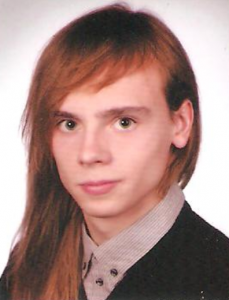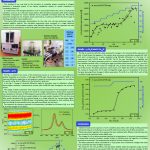
Aleksander Albrecht won a poster prize at the 3rd LabMeeting @ STOE, therefore we want you to learn about him and his exciting research. He studied at the West Pomeranian University of Technology in Szczecin, Poland, at the Faculty of Chemical Technology and Engineering where he got his engineer and master of engineering degrees in nanotechnology. His theses concerned the formation of thin metallic films on MgO surfaces (2018) and nitriding of nanocrystalline transition metals (2019) [1]. The latter became his main scientific interest, which led to the publishing of 4 papers. During his scientific journey, he participated in 3 projects and completed an internship at the Ss. Cyril and Methodius University (Skopje, Macedonia). During his studies, he was awarded a “Diamond Grant“, a prize funded by the Polish Ministry of Science and Education.
Aleksander is currently a PhD student at the Doctoral School of West Pomeranian University of Technology in Szczecin, Poland. He is working on finding a relationship between the size of the crystallites and the thermodynamic boundaries of phase transitions in the nanocrystalline Fe-N system. His main focus is the region of temperatures between 350 °C – 500 °C.
Tell us shortly what your poster is about.
My poster concerns the lattice parameter changes in the nanocrystalline Fe-N system during nitriding process under NH3:H2 atmosphere of variable concentration.

Does the poster represent the full extent of your work or is there even more about it – for example a greater context inside the team?
The presented research was a small part of my everyday studies, where I connect in situ XRPD, TEM, SEM, TG and elemental analysis methods to describe nanocrystalline Fe-N systems with different and defined crystallite size distributions during nitriding and denitriding processes. The main aim of my work is to combine extensive experimental work with simple thermodynamic modelling, resulting in empirical description based on theoretical foundations.
What was the biggest challenge you faced during your work/thesis?
The biggest challenge during my work is connected to my ambition to reconcile being PI in my first project, helping other projects in the faculty, taking care of the local quasi in situ XPS measurements [2] and managing in situ experiments for my PhD studies (that are generating large numbers of data to be processed). Thankfully, some great people are always around to help.
References
[1] P. Adamski, D. Moszyński, A. Komorowska, M. Nadziejko, A. Sarnecki, A. Albrecht: Ammonolysis of Cobalt Molybdenum Oxides – In Situ XRD Study, Inorganic Chemistry 57, 9844 (2018), https://doi.org/10.1021/acs.inorgchem.8b00685.
[2] A. Sarnecki, P. Adamski, A. Albrecht, A. Komorowska, . Nadziejko, D. Moszyński: XPS study of cobalt-ceria catalysts for ammonia synthesis – The reduction process, Vacuum 155, 434 (2018), https://doi.org/10.1016/j.vacuum.2018.06.034.